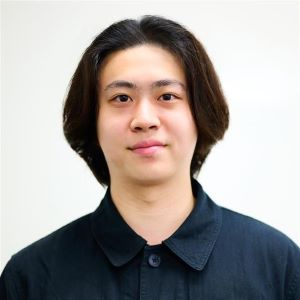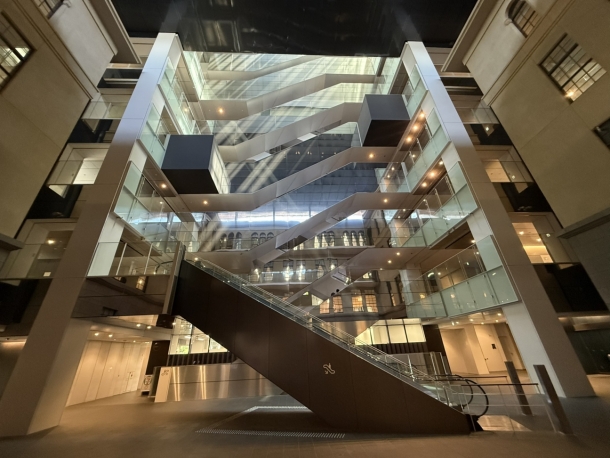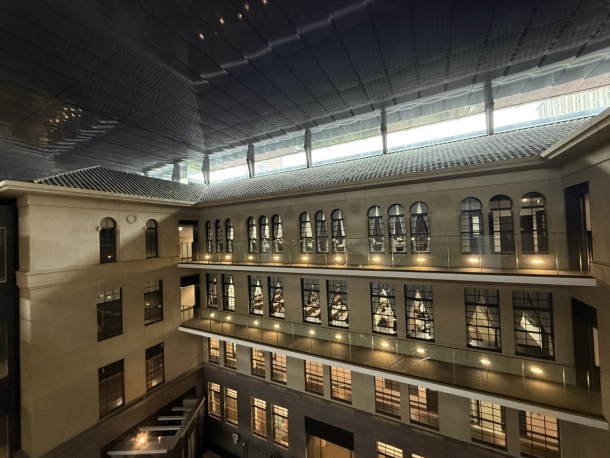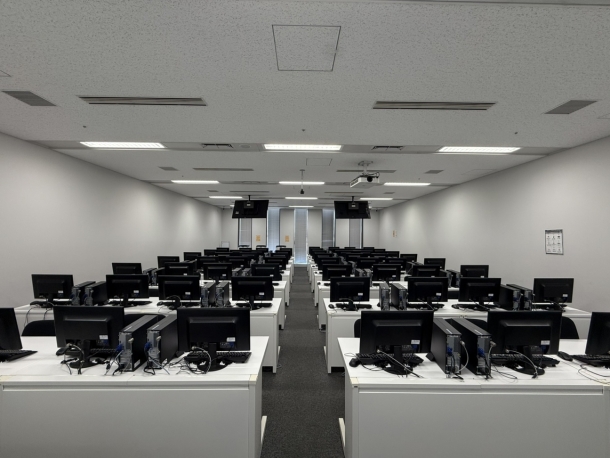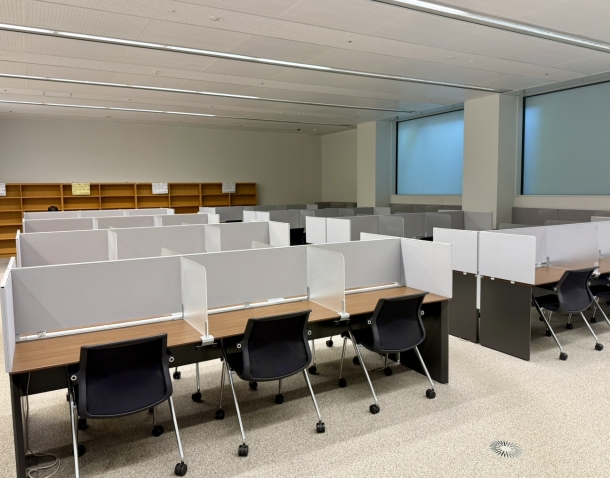How Waseda Supports Its Graduate Students to Grow as Researchers
Mon, Jun 9, 2025-
Tags
Waseda currently offers English-based degree programs (EDP) for graduate students at 16 of its graduate schools, and there are now more than 3000 international students studying at those graduate schools, including Ph.D. students, who can take courses and conduct research fully in English. Waseda offers an academic environment which equips students with various research skills to conduct research and supports them with diverse opportunities to grow as young researchers.

Working in the graduate students’ lounge on the 11th floor of Building 3
My name is Peter Chai (Kai Shibata), and I am a Ph.D. student studying in the English doctoral degree program offered by the Graduate School of Political Science (GSPS). Before entering the doctoral program, I studied in the English undergraduate degree program at the School of Political Science and Economics (SPSE) and the English master’s degree program at GSPS. My research uses transnational survey databases such as the World Values Survey and Asian Barometer to empirically investigate the relationships between citizens’ attitudes toward postmaterialist topics such as gender equality, environmental protection, and immigration and demographic indicators such as age, education, and income. In this article, I am happy to introduce how the courses, professors, events, and facilities at Waseda have helped me grow as a young researcher based on my own experiences studying and researching in the social sciences at the SPSE and the GSPS.
How Waseda Equips Students with Hands-On Research Skills

Building 3, home of the Faculty of Political Science and Economics
The SPSE offers a range of courses across academic fields in the social sciences such as political science, economics, and global political economy as well as across methodologies such as empirical, formal, and philosophical analyses. Students can gain a holistic view of various disciplines and methodologies in the social sciences, get insight into how those disciplines and methodologies are related and have developed over time, and become familiar with important thinkers and scholars and their theories.
The SPSE offers courses with different difficulty levels to choose from, and students can gradually explore and narrow down their research interests and develop research skills relevant to those interests. In particular, the SPSE offers advanced seminars or “zemis” led by professors in various fields, and students are encouraged to read important historical and recent works in those disciplines and discuss their key findings and potential limitations with other seminar members through presentations and groupwork. For example, I belonged to Prof. Willy Jou’s advanced seminars in comparative politics, and I learned to conduct literature reviews, identify research gaps in the existing literature, and come up with my own research questions.

The view of Okuma Auditorium from Building 3
Moreover, SPSE offers intensive courses and special seminars in research design where students can practice writing codes and using programming software such as RStudio and STATA. I participated in summer school programs focused on survey and text analyses, which were taught by guest instructors from other universities such as Essex University and the Australian National University, and I strengthened my quantitative skills to summarize, analyze, and visualize data. Furthermore, the SPSE offers opportunities for students to work as part-time research assistants and participate in actual research projects. For example, I worked as a research assistant for some professors and helped them with collecting and cleaning diplomatic and financial data. With the hands-on skills I obtained from the courses, seminars, and research assistantships, I was able to write my undergraduate thesis based on an original survey experiment I designed and implemented online.
How Waseda Provides Students with Practical Academic Experiences
GSPS gives graduate students the chance to receive rigorous training through methodology courses, reading seminars, and graduate seminars specific to their research areas. Students can regularly present their works in progress in the graduate seminars led by their main and sub-advisors and receive feedback from the professors and seminar members so that they can find ways to improve their ongoing research. GSPS often organizes academic conferences and workshops which invite visiting researchers from other universities and countries, and students can broaden their perspectives about interesting topics and cutting-edge methods in their fields, receive further advice about their ongoing research, and engage in cross-cultural dialogues. I, myself, often receive constructive comments from my advisors Prof. Willy Jou and Prof. Liang Tang as well as researchers in the workshops and conferences about the limitations in my models and questions about what qualitative explanations could be provided for my statistical results.
- The escalators in Building 3
- The interior of Building 3
Moreover, GSPS encourages students to seek career advice from their supervisors and join academic societies and conferences within and outside of Waseda. Through presenting works in progress, students can improve their professional skills in preparing academic posters and presentation slides and delivering oral presentations, and through listening to others’ research, students can learn from the research designs of more experienced researchers and more objectively evaluate their own works. For example, I attended and occasionally presented my works at conferences and workshops organized by the Waseda Institute of Political Economy (WINPEC), the Waseda Association of Political Economy, and the Japanese Society for Quantitative Political Science. Thanks to these opportunities, I was able to discuss research ideas, exchange information, and build networks with researchers in similar research areas. Furthermore, graduate students have opportunities to work as part-time teaching assistants and get a taste of what it would be like teaching in a university. I worked as a teaching assistant for some undergraduate seminars where I was responsible for recording attendance, facilitating classroom discussions, and making presentations to introduce common codes and packages in the programming language R. In addition, preparing presentation materials and answering questions for others enhanced my own programming knowledge.
GSPS has plenty of research-friendly facilities where students can focus on writing, analyzing data, and consulting resources on their own in the graduate students’ rooms, libraries, and computer rooms. Moreover, students can interact with peers and professors in a relaxing atmosphere in the lounges in Building 3 as well as during networking events held by GSPS in the Orange Cat café inside the International House of Literature (Haruki Murakami Library).
- A computer room on the 9th floor of Building 3
- The reading room for graduate students located on B1 of Building 3
International students have opportunities to receive scholarships provided by Waseda and external foundations. For example, I received a partial tuition waiver and JASSO scholarships during my undergraduate and master’s programs and the Scholarships for Fostering Researchers in Doctoral Programs and Park Yong Koo Scholarships during my doctoral program. They have allowed me to focus on research and taking part in interesting campus activities. With the help of the guidance and comments from my supervisors, seminar members, and the comfortable research facilities, I wrote my master thesis which used the World Values Survey (WVS) to investigate postmaterialist values across the Greater China area, and now I am working on my doctoral thesis which looks at various dimensions of postmaterialist values across the Greater China area.
Waseda provides its graduate students with diverse opportunities to take courses and seminars, attend and present in workshops and conferences, and work as research and teaching assistants, and much more. These opportunities not only introduced me to the charms and challenges of conducting research in the social sciences but also equipped me with the necessary skills to address some of those challenges in my own research. Last semester, I made a presentation in a WINPEC seminar, which discusses the attitudes toward family structure and gender roles in Mainland China based on the latest waves of the Asian Barometer. This semester, I wrote a WINPEC working paper which investigates the environmental awareness and activeness in Mainland China with the latest waves of the World Values Survey. In the future, I would like to explore more topics in public opinion and make use of different survey databases. I look forward to presenting my findings in more workshops and conferences, publishing my works in journals, and interacting with other researchers in the future.
This article is written by the following Student Contributor:
Peter Chai (Kai Shibata)
Graduate School of Political Science
